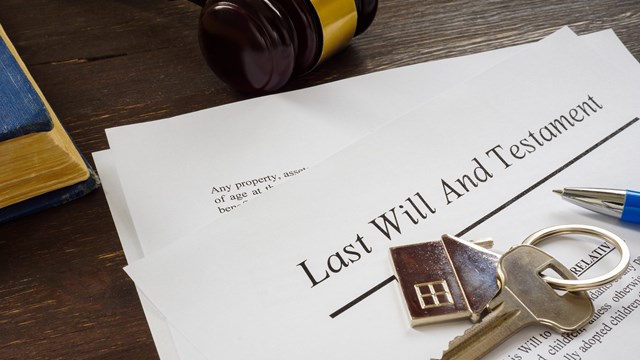
Most people would rather not talk about divorce or death. Unpleasant as they are however, they're both facts of life—facts that any apartment owner must face up to and plan for.
In the case a co-op or condo apartment, a thorough, legally sound plan for your property is one of the most important things to do before the need arises. Questions over ownership and inheritance are the last thing a grieving or separating family needs at what is already a very difficult time.
Co-op vs. Condo
Whether you are living in a condo or a co-op, it's important to look at your building's governing documents to determine what happens in the cases of inherited property.
"The legal difference in the two forms of ownership is that with a condo you have a deed to your apartment just like a detached home," says Gerard Dunworth, an attorney with Gibney Anthony & Flaherty, LLP in Manhattan. "With a co-op, you own shares of stock in the cooperative corporation and you also have a lease to your particular apartment. In addition, the co-op board must approve all changes in ownership of the share of the cooperative corporation. That's what gives them control over who can live in the building."
Basically this means that even though someone wills you a co-op apartment, it doesn't mean that you can just move in without going through the same process that everyone else who lives there had to go through—that means submitting to an extensive examination by the board.
"When you are looking at the difference between them when someone dies, most condos permit transfers by gifts during an owners life under a will or state inheritance laws, without first applying to board under right of first refusal," says Mindy Stern of Schoeman, Updike & Kaufman, LLP in Manhattan. "Co-ops usually require board approval in those scenarios. Some co-op proprietary leases have provisions that say they won't withhold their consent to a transfer after death to certain family members and will identify them (spouse, adult children, siblings, parents). A small number of other co-ops—usually much older co-ops—will permit transfers on death to designated family members without board approval, but most require board consent."
A co-op will be transferred at the time of its owner's death in one of the following ways: Either to their heirs through the owner's last will and testament or living will, or to the joint owner. When organizing a person's estate, as executor you have to determine which is the most efficient.
"Often it is simply having the shares in a joint name," says Dunworth. "If that doesn't work—if there may be several children who will inherit, for example—then you pick either a will or a living trust. The living trust is used to avoid going to the Surrogate Court to probate a will. In order to use a living trust though you have to obtain the permission of the co-op board and also the bank if there is a mortgage. This could be a cumbersome process."
Co-op boards will generally approve the change of ownership to the living trust, but they usually want their attorneys to review the documentation. In addition the co-op boards usually ask the tenant to sign a personal guarantee of the maintenance and to sign an occupancy agreement allowing the co-op board to stay in control over who will live in the apartment.
Get it in Writing
It's important that you get the proper documentation in order before unforeseen events such as divorce or death happen.
"With a divorce, either a prenuptial or postnuptial agreement will be required in the transfer of a condo or co-op, assuming that the governing documents have allowed for the new owner," says Philip Burke, an attorney at Woods Oviatt & Gilman LLP in Rochester. "When dealing with death, a last will and testament or living trust is required."
You can also have a separation agreement that decides where the property goes, but according to most experts, the real time to protect yourself is with the prenuptial agreement before a wedding.
Interestingly, having the documentation saying you are an owner is not always enough, especially in the cases involving death.
"If someone jointly owns their co-op or condo, the two people who own it as joint tenants with rights of survivorship, or as husband and wife, which is a form of this, then the surviving co-owner of the apartment is entitled to inherit the share of the deceased co-owner no matter what the will says," Stern says. "If the co-owner is a surviving spouse and the will leaves everything to the adult children, the surviving spouse would inherit the apartment by operation of law, even though the will says everything should be left to the adult children."
Tax Benefits
Some may think that transferring a co-op or condo apartment to a spouse or child will help with estate tax benefits, but according to Burke, you cannot generalize whether there will be estate tax benefits in these cases.
"Lifetime gifts may also be subject to a gift tax so it all depends on the situation," he says. "There are no estate taxes owed when someone leaves a property to the surviving spouse, though it's not always an elimination of tax, but a possible deferral of tax."
At the death of the first spouse, no estate tax is owed.
"Sometimes people purposely set it up so that instead of the asset going to surviving spouse, it goes to a trust called a credit shelter trust for surviving spouse to benefit during his or her lifetime," Stern says. "Or they prefer to go to adult children outright to achieve certain tax planning benefits. Under current federal law, you can transfer up to $2 million to anyone you want without there being estate tax owed."
Need for Approval
When a co-op owner dies or divorces, there could be issues that need to be addressed by the board or co-op association.
"Usually if the apartment goes to someone already living in the apartment there are no issues. That person has already been approved," Dunworth says. "If someone dies and leaves the co-op to children who want to move in, they will have to go through the usual approval process. They have to prove they have the finances to afford to live in the building and they have to go for an interview to show they will act like nice tenants."
Again, the governing documents of the proprietary lease of condo bylaws will have the rules.
"If the co-op proprietary lease requires board approval, then the children would have to submit an application just like any purchaser would," Stern says. "The co-op would have to approve them, not only their financial worthiness but at an interview. The board can grant or withhold consent for any reasons or no reason in New York and they are not required to disclose their reasons."
Executor's Song
When someone who owns a condo or co-op dies, and leaves no direction as to who gets the property, it is the responsibility of the executor to immediately check to make sure there is homeowners insurance and that the apartment is secure. Then it is their job to sell the apartment and add the proceeds to the estate.
"In New York, the court appoints the executive and they are responsible for locating and valuing all the assets, paying all the estate debts, funeral expenses, medical, administration expenses, appraisal, paying all the taxes, income taxes, state taxes, selling any property, filing all tax returns and distributing whatever is left to the beneficiaries," Stern says. "The executor is personally liable if they don't carry out duties and responsibilities and don't transfer the property to people entitled to it."
Misconceptions, Mistakes and Melodies
People may think they know what will happen in the case that they die or get divorced, but many times they are mistaken about what really goes on.
"A lot of people are under misconception that if they are left a co-op in a will that somehow it obligates the co-op to allow them to inherit it and they may not have the right to," Burke says. "If someone owns something that has strings attached, those strings get transferred to the new owner."
Dunworth has dealt with cases where children have refused to move out of the apartment after their parents die and that could cause many headaches.
"This causes problems for the other children who are not living there and would like the apartment to be sold so they can receive their share of the inheritance," he says. "You also get issues when children cannot agree over the furniture distribution even when used furniture has little value."
As a general matter, there are still a lot of people who do not have wills and are under the assumption that if they die, that certain family members will automatically inherit their property and that's not necessarily the case.
"Under New York law, if someone is survived by a spouse and children, both are entitled to a portion of the estate," Dunworth says. "Someone who thinks the surviving spouse will get it all is just misinformed."
Keith Loria is a freelance writer and sports reporter living in Larchmont, New York.






48 Comments
Leave a Comment